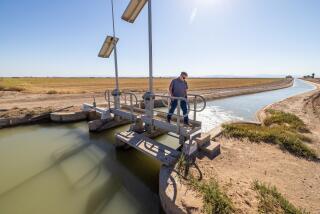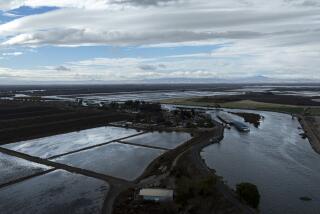THE CALIFORNIA DROUGHT : Imperial Valley Asked to Send Water to Cities
- Share via
WASHINGTON — In a highly unorthodox move, Bureau of Reclamation Commissioner Dennis B. Underwood has asked Imperial Valley growers to cut back their water use voluntarily by 7% to relieve water shortages in Los Angeles and other urban areas of Southern California.
Underwood flew to El Centro on Saturday to appeal to the directors of the Imperial Irrigation District to reduce their water consumption by 200,000 acre-feet and make the water saved available to the Metropolitan Water District.
Initial reaction to his proposal was mixed, with many growers contending that such a cutback in water use could be damaging to agriculture in the Imperial Valley while others said that they could forgo 3% or 4% of their supply.
“They were pretty understanding,” Underwood said.
The federal bureau that Underwood heads has been under pressure from key members of Congress to take more water from farmers irrigating crops and divert it to city dwellers.
In the past, reclamation commissioners generally have defended the interests of growers and others who receive subsidized water under contract from the federal government.
Interviewed Monday after his return to Washington, Underwood said he made his request because other areas in California are facing hardships from the drought that could be alleviated somewhat by a relatively small reduction in irrigation for Imperial Valley crops.
“They (Imperial’s growers) are basically getting a full supply of water this year,” Underwood said. “There are a lot of people undergoing substantial hardship, and they (the growers) have an opportunity to provide some relief to the state.”
If the drought crisis persists, he said, federal authorities or the state of California could order a reduction in water flowing to Imperial Valley growers.
Unlike growers elsewhere in the state, those in the Imperial Valley--which relies almost entirely on water from the Colorado River--have had no cutbacks. Farmers served by the federal Central Valley Project have taken a 75% cutback in water this year and growers served by the State Water Project have been shut off entirely.
Because Imperial growers use almost 3 million acre-feet of water, Underwood calculated, a 7% savings would provide enough water for 1 million to 2 million people in urban areas, depending on the kind of restrictions imposed on cities.
Underwood, former head of the Colorado River Board of California, said he went to El Centro on an overnight flight and made the request personally to underscore his view that the drought is a “very, very serious problem.”
Recent rains in California, he said, will ease conditions slightly but came too late to have any great effect on the amount of water in reservoirs in the northern part of the state.
“The early reports that I have now are that in the first couple of days in March we’ve already had between 80% and 90% of the (normal) precipitation for March,” Underwood said. “Obviously, that’s a good sign.”
He added that 70% of the snow and rain that falls in Northern California comes in the November-February period and only 30% of the annual total normally falls in March and April.
For the long term, Underwood said, improvements in water treatment technology may hold the key to the state’s growth. If waste water could be treated and made safe for drinking, he said, Southern California could gain another 1 million acre-feet of water each year that is now dumped into the Pacific Ocean.
“We need to institutionalize drought management,” he said. “That’s our big focus. It’s not just in the West but in other states as well that there are diminishing margins of reserves between supply and demand.”
More to Read
Sign up for Essential California
The most important California stories and recommendations in your inbox every morning.
You may occasionally receive promotional content from the Los Angeles Times.













